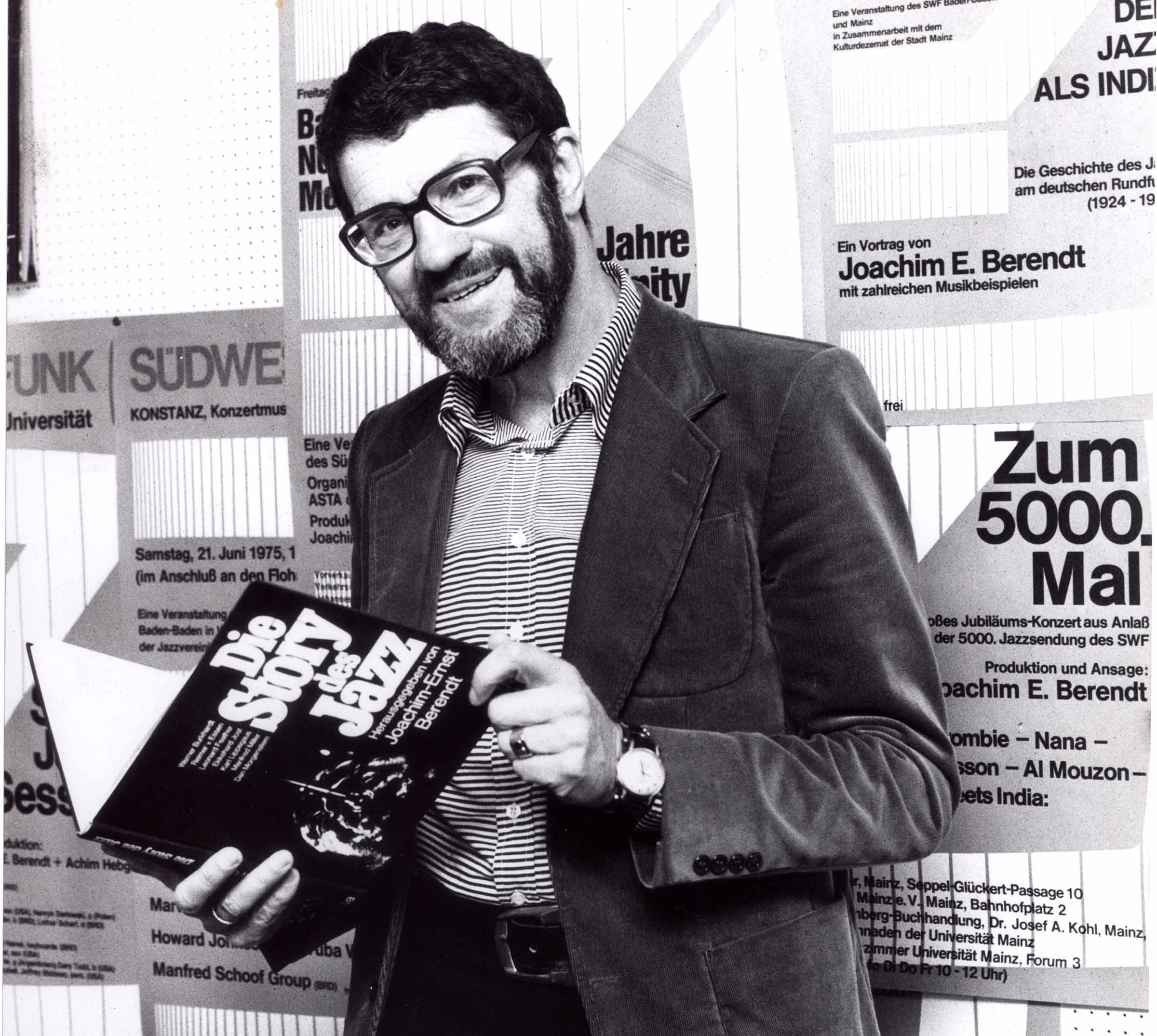Joachim-Ernst Berendt – the son of a pastor who became a jazz pope (Photo ©MPS Archive)
“Whoever writes stays” is the saying in skat. It’s the same when you look at the history of the SABA/MPS studio and record label. The new 75-minute film “Die Legende lebt“(here in the ARD Mediathek) by Sascha Schmidt and Micha Bojanowski is the second documentary about the cult label from the Black Forest after “Jazzin’ The Black Forest” by Elke Baur and shines with historical footage with Oscar Peterson, the MPS studio or the Singers Unlimited. At the end, the entertaining documentary turns melancholy when Marlies Brunner-Schwer († 1.4.2023) sits alone in the living room where all the legendary house concerts took place, thinking of the past times when her husband Hans-Georg Brunner-Schwer (HGBS) wrote jazz history.
One can only begin to imagine what an incredibly diverse and multifaceted oeuvre of releases the SABA/MPS record label has to offer. has brought to the market over the years. Brunner-Schwer released not only jazz, but also pop hits, so-called “upscale light music” and classical music; in addition, he also licensed productions from overseas from “Prestige Records”, ranging from Miles Davis to Thelonius Monk. In total, we are talking about far more than 1000 productions. Some of these records are highly sought after today, which is why these vinyl rarities are often only available for very high prices.
The press release mentions Lisa Boulton as supposedly the only surviving former MPS employee. Many other ex-MPS employees are still in the best of health. Among them Hans Pfitzer, the head of the advertising department, his employees Achim Frey and Dieter Hahne (later at FMP Berlin); also Christa Gugeler the studio sound engineer and Aki Kienzler, who was involved from 1962, are still alive today.
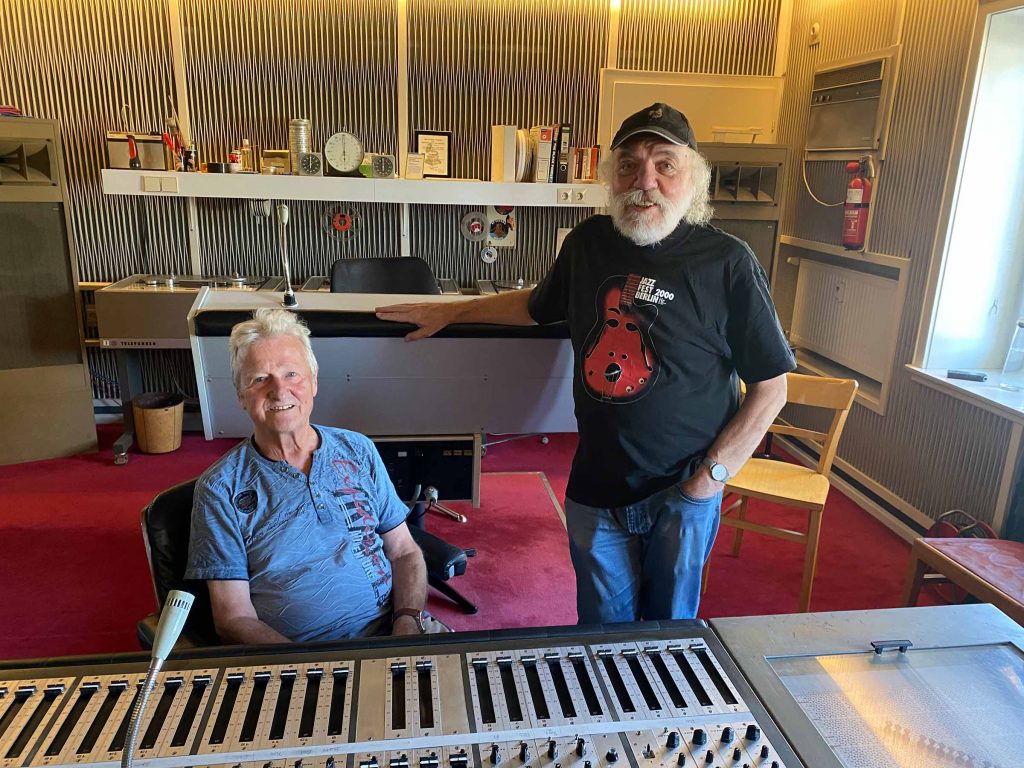
Were employed in the advertising department at MPS in the early 70s: Sitting Achim Frey, standing Dieter Hahne, visiting the MPS studio in September 2023 (Photo ©MPS-Studio e.V.)
However, the veil of oblivion does not only lie over the MPS team (including substitutes), which probably numbered around 60 at its peak. But there are also significant gaps in the circle of people who played a key role at MPS/SABA: for example Rolf Donner, who makes many former MPS employees’ eyes water when they talk about him. The fact that MPS soon also stood for “The Most Perfect Sound” was most certainly thanks to Donner, who learned sound engineering from the ground up. In the movie, however, he is not mentioned at all. The boss, Hans-Georg Brunner-Schwer, on the other hand, was said to have an absolute ear and was certainly a highly ambitious sound enthusiast, an accomplished technical tinkerer, a great enabler with very high quality standards, but he had no corresponding sound engineer training and as an autodidact was therefore dependent on experienced professionals such as Rolf Donner or Christa Gugeler.
The documentary also gives the impression that the music, for which the label has built its excellent worldwide reputation for good reason, is somewhat neglected. But nowadays the knowledgeable music lover can get an idea for himself on the Internet, for example with our SABA/MPS Spotify Playlist .
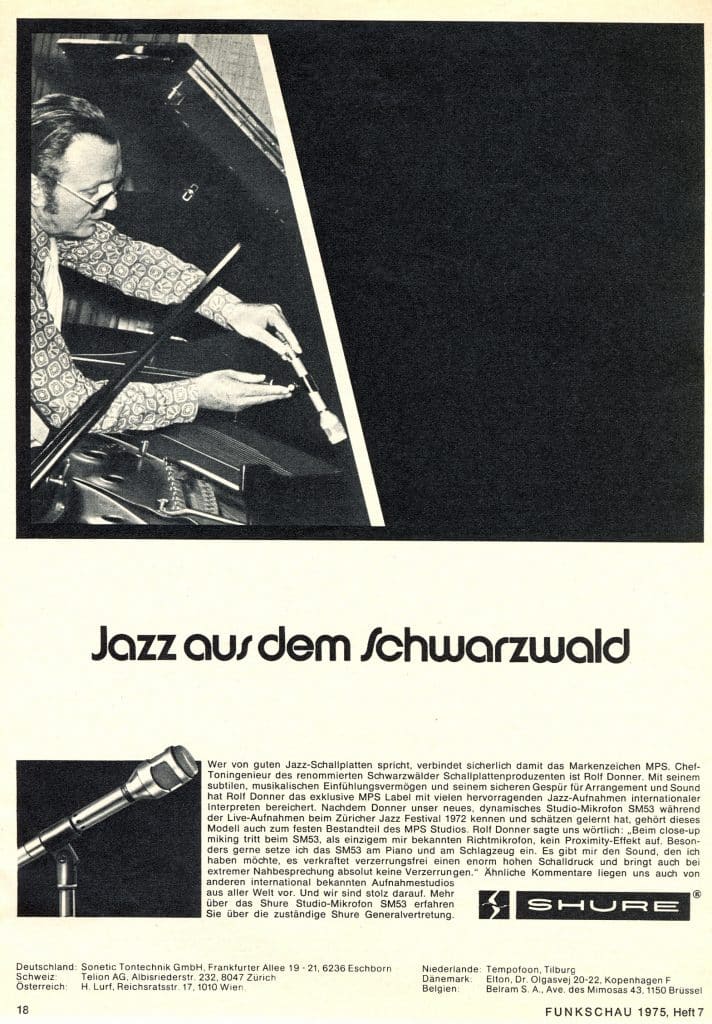
The Shure company advertised with Rolf Donner/MPS in the 1975 Funkschau (Archive Harald Greilich / MPS-Studio e.V.)
THE JAZZ POPE
It is a pity how Joachim-Ernst Berendt (JEB) is treated in “MPS-The legend lives” – without properly acknowledging his merits. The bassist Eberhard Weber claims with a grin and a classical muckraking attitude that “Berendt was unmusical” and contradicts himself in the same sentence that “Berendt knew exactly who played when, with whom and in which key”. Joachim Ernst Berendt is anything but an unknown figure in the music world of the post-war years, and his involvement with MPS/SABA makes him an obvious choice. The ambivalent relationship between HGBS and JEB, which is probably also characterized by vanity and a certain alpha dog attitude, is particularly exciting. “Competition boosts business”, as the saying goes – and that may also be true here. In any case, it is worth taking a closer look at the two very different biographies of these two men, who each gave their all for jazz in their own way.
Like HGBS, the young Berendt had learned to play the piano in his youth. He later published numerous books on music, sound and listening. He was certainly not unmusical. He launched the series “Jazz meets the World” for MPS, thus founding the genre of so-called world music and proving time and again that he was way ahead of his time. At the same time, these recordings are one of the central pillars on which the international reputation of the record label rests. Almost all progressive and avant-garde productions on SABA/MPS were initiated by Berendt.
I made my first world music production in 1962 – a trio of Japanese koto players and the leading Japanese jazz ensemble at the time … I tried something similar in Djakarta, Kuala Lumpur, Bombay, New Delphi, Tunisia, Africa and Brazil. An entire record series was created…the first world music series ever.
(Joachim Ernst Berendt / Life is a sound)
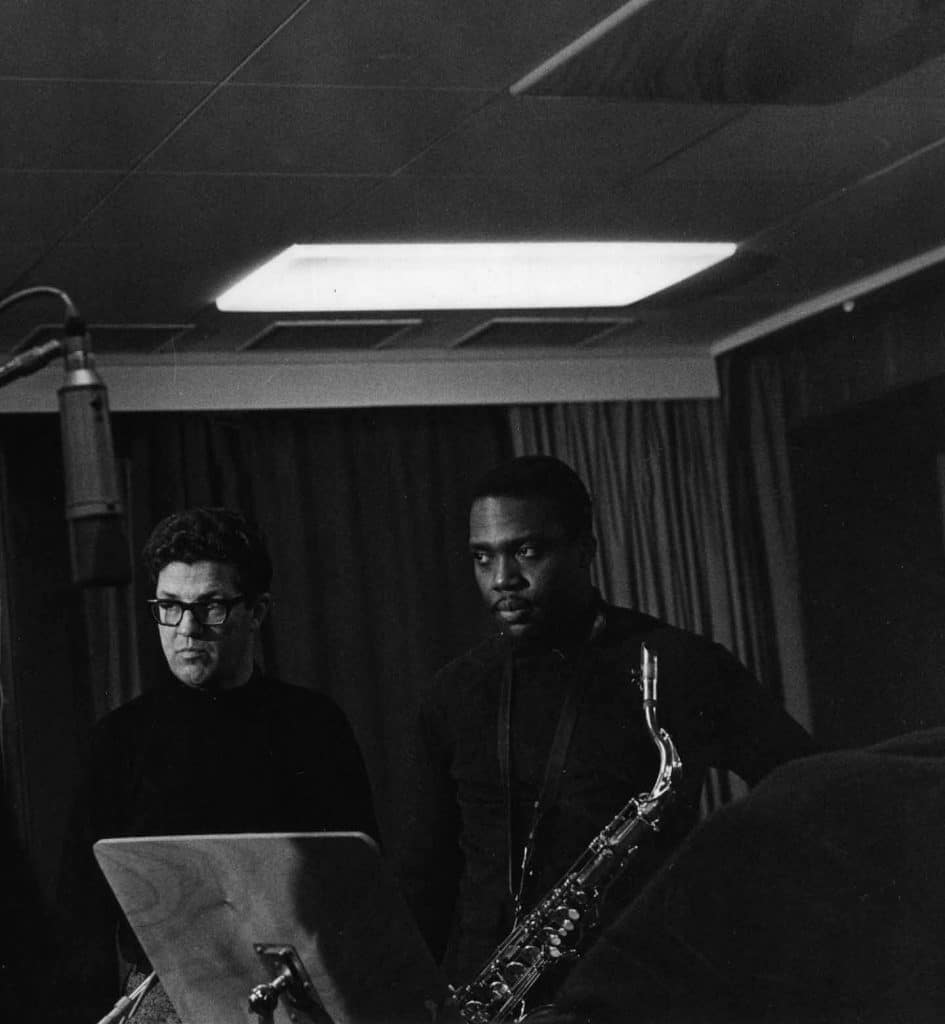
Joachim Ernst Berendt with Nathan Davies 1965 in the MPS-Studio (Photo ©German Hasenfratz/MPS-Studio e.V.)
Berendt, born in Berlin in 1922, was a descendant of assimilated Jews. His mother left home when he was 3 years old, so he spent part of his childhood at boarding school. His strict father Ernst Berendt was a Protestant pastor who initially practiced in Berlin Weißensee. Due to increasing problems and arrests by the National Socialists, he moved to Baden-Baden and was eventually sent to Dachau concentration camp, where he was finally murdered. Berendt visited his father in a concentration camp in 1942, a formative experience. He was later sent to Russia, where he was deployed in the Leningrad ring. As a member of the 1922 cohort, he was one of the few who survived their deployment, as every third soldier of this generation died.
After the war, Joachim Ernst Berendt was the first employee of Südwestfunk. As a politically-minded journalist, busy festival organizer, writer, producer and, above all, anti-fascist, it was he who introduced many Germans to jazz after 12 years of marching music.
We were not only successful. We felt the resistance. Südwestfunk received letters of protest. One told me to be careful when I went home in the evening, otherwise “a few good German men’s fists would teach me the right rhythm.”
What actually characterizes jazz – the personality of improvisation and phrasing, the play with different time levels in the phenomenon of swing, the renunciation of binding standards of tone formation – carries a message that cannot be misunderstood. It means tolerance, openness, freedom, individuality and personal responsibility. My sentence “Dictators don’t swing” made the rounds.
(Joachim Ernst Berendt / Life is a sound)
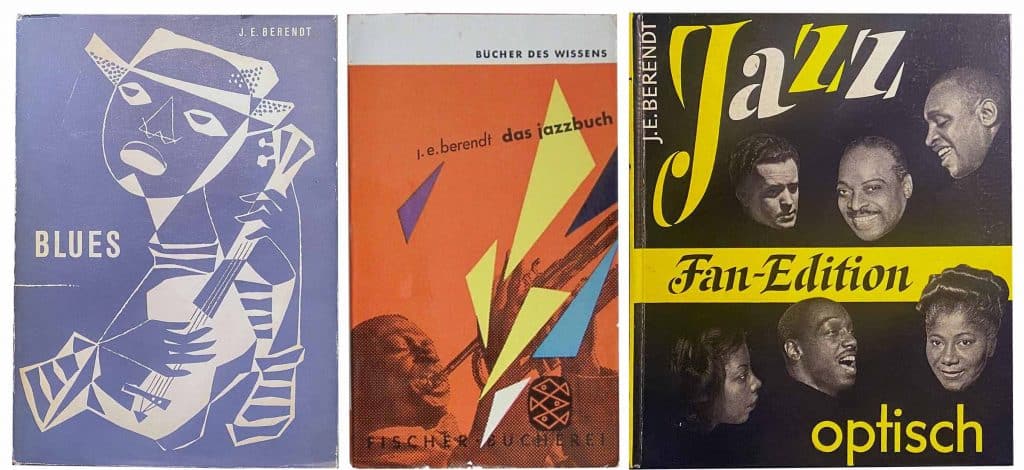
Books by Berendt (selection) © Archive MPS-Studio e.V.
He travelled the USA and found friends there, where jazz and blues have their roots, and he brought them to the stages of the festivals he organized. He had a close friendship with John Coltrane and many other greats of the scene. Berendt is still held in high esteem in the jazz world today. His television series “Jazz gehört und gesehen” was groundbreaking. His “jazz book” is considered a standard work and has been translated into several languages.
…my plus was always the overview of all jazz – from ragtime to free. That was probably also what made my “jazz book” the “textbook on jazz” in the USA … strangely enough, a book by a German about this most American of all arts, which for American sensibilities is the complete antithesis of the world status of “German music”.
(Joachim Ernst Berendt / Life is a sound)
Berendt, also known as the “jazz pope”, founded the Berlin Jazz Days, the New Jazz Meeting Baden-Baden and organized the jazz section at the Donaueschingen Music Days. Thanks to Berendt, the audience were able to enjoy a Sun Ra concert. Now guess where the recording of this concerto was later released?
Berendt was not always well-liked at MPS as a musical free spirit, but as a jack-of-all-trades he was also an absolute asset for Brunner-Schwer and his label/recording studio, who quickly recognized the sales potential of Berendt’s productions. Even though Brunner-Schwer deliberately avoided Berendt’s studio days with extended hairdressing appointments in Zurich, the sound avant-gardist’s worldwide contacts enabled HGBS to build up a really broad repertoire for his label. HGBS did not want to release some artists on his label: Peter Brötzmann (“he won’t come into my studio”), Herbie Hancock, Ornette Coleman or Wayner Shorter. Today, Behrend is credited with over 130 productions for SABA/MPS in addition to numerous liner notes.
It quickly became clear that HGBS and Berendt had rather different musical passions. While HGBS was dedicated to old school swing and above all to piano productions with great recordings by Oscar Peterson, Bill Evans, Milt Buckner, Horst Jankowsky or Monty Alexander, many important pianists were produced in the studio or in the house studio, Berendt was a modern jazz man who brought impulses from free jazz, psychedelic jazz or world music to SABA/MPS at the same level as the times. A perfect mix for a broad-based label like MPS. What would MPS be without the Berendt productions with the Dave Pike set, the “Jazz meets the World” recordings, Archie Shepp, Baden Powell, Nathan Davies, Don Cherry, Cecyil Taylor or the great Albert Mangelsdorff LPs? With the Gunter Hampel Quintett and the album “Heartplants” he produced the first European free jazz record. Looking at the many groundbreaking productions and liner notes that Berendt has launched for SABA/MPS, one regrets that this man has not been given more than 80 seconds in this current film. Berendt’s creative frenzy for jazz is actually worth its own documentary.
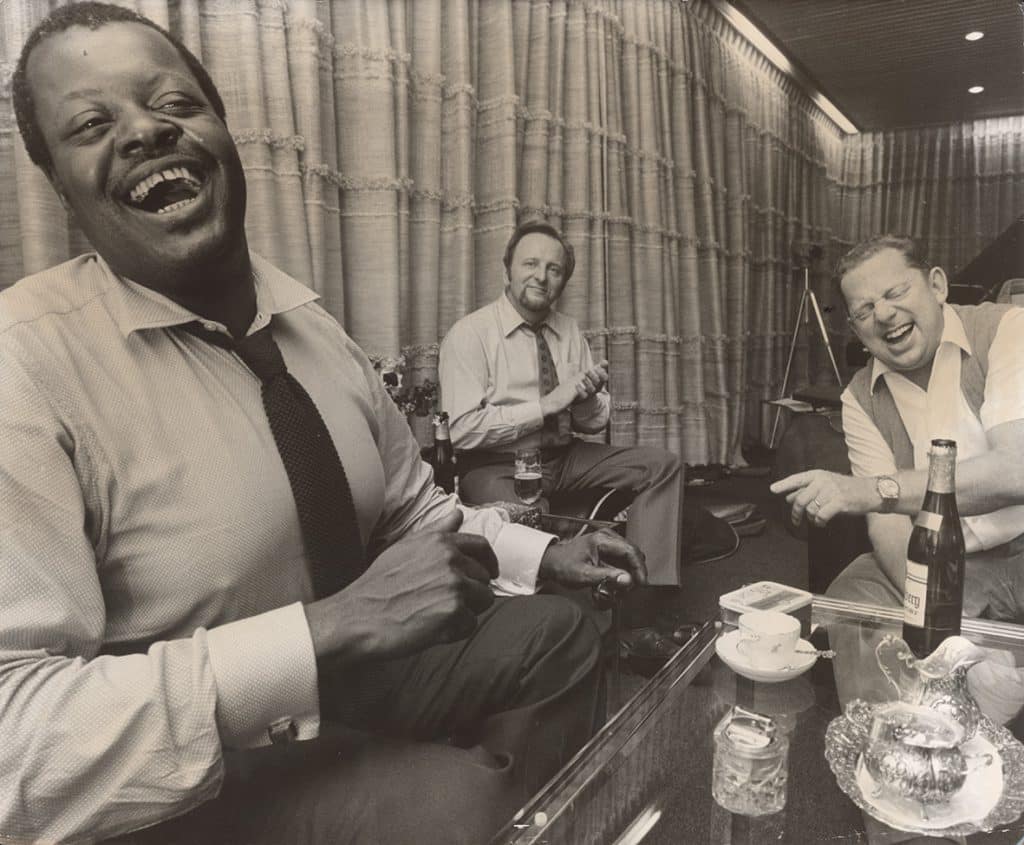
Oscar Peterson, Willy Fruth and HGBS over a glass of beer in the Villa Brunner-Schwer (Photo ©MPS-Studio e.V.)
THE ENABLER
In contrast to JEB, HGBS was also a rather conservative man in biographical terms, born in 1927 as one of the SABA descendants in Villingen with the famous “golden spoon in his mouth”. Founded back in 1835 by Josef Benedikt Schwer in nearby Triberg, SABA was the biggest player in the Zähringen town alongside Kienzle and had over 3,500 employees (mid-1960s). The company had prospered from 1927 with radios, and later televisions and refrigerators, because the appliances “Made in the Black Forest” had an excellent reputation in terms of quality, sound and workmanship. The story goes that Max Grundig was pathologically jealous of the Black Forest competition. But SABA’s glorious history also had its dark side: the company profited from armaments orders during the dark days of the Nazi regime and produced the infamous Volksempfänger (people’s receiver). There was a forced labor camp directly on the company premises and, as a family of industrial importance, his brother Hermann and their mother also visited the Führer on the Obersalzberg.
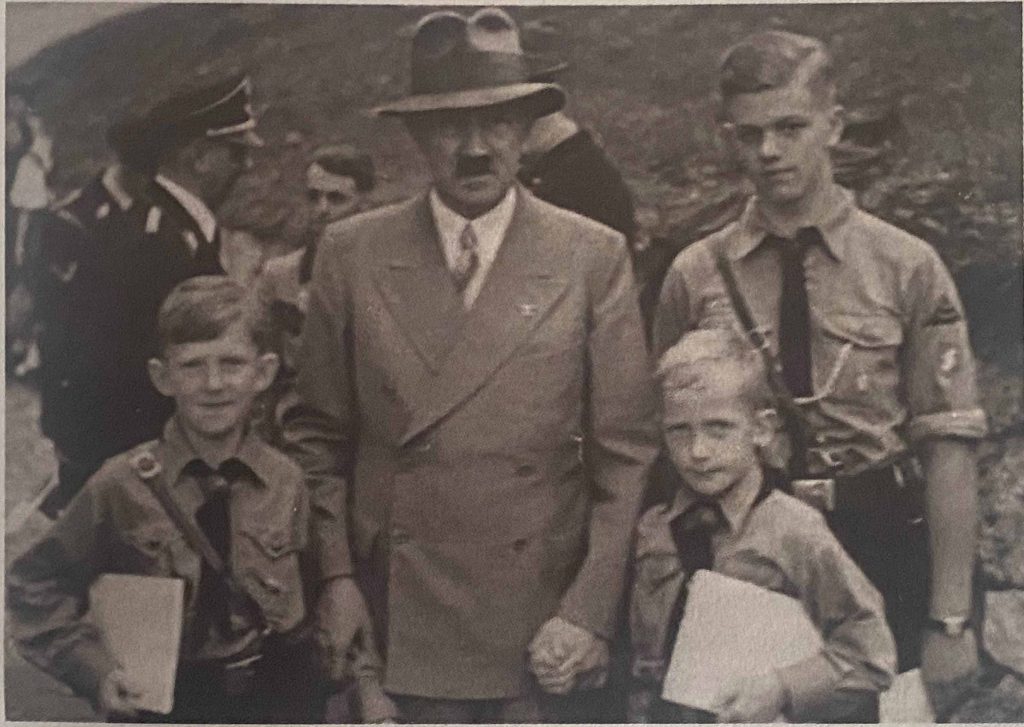
HGBS, Hitler and Hermann Brunner-Schwer on the Obersalzberg (from the out-of-print book “SABA – Bilanz einer Aufgabe” by Hermann Brunner-Schwer)
The young Hans-Georg heard his first jazz in the war year 1944 while illegally listening in on American bomber units, because the pilots were kept on course with jazz music on their ears. The 17-year-old HGBS intercepted these signals and discovered Glenn Miller ‘s “Moonlight Serenade” in an unusual way. This experience was formative for him.
After the war and the economic miracle, HGBS was to take over the management of SABA-Werke together with his brother Hermann in 1961. After HGBS had already made his first recordings with Hans Koller and Wolfgang Dauner, among others, in his home studio in the late 1950s, he founded the SABA studio in 1962 in the premises of a former pasta factory just 100 meters from his home. The premises in Richthofenstraße were temporarily occupied by the Brunner-Schwer family after the Second World War until the 1950s, when their own villa was confiscated by the French army. Just a few years later, it housed one of the most modern studios of the time. When SABA was taken over by the American GTE Group in 1968, HGBS operated independently of SABA and under the new name MPS (Musikproduktion Schwarzwald) in order to pursue its passion with a multi-million euro purse and a great deal of ambition and love for the perfect sound: Music productions, record releases and licensing ensured recognition, attention and jobs. In the late 1960s, he was one of the biggest jazz producers in Europe.
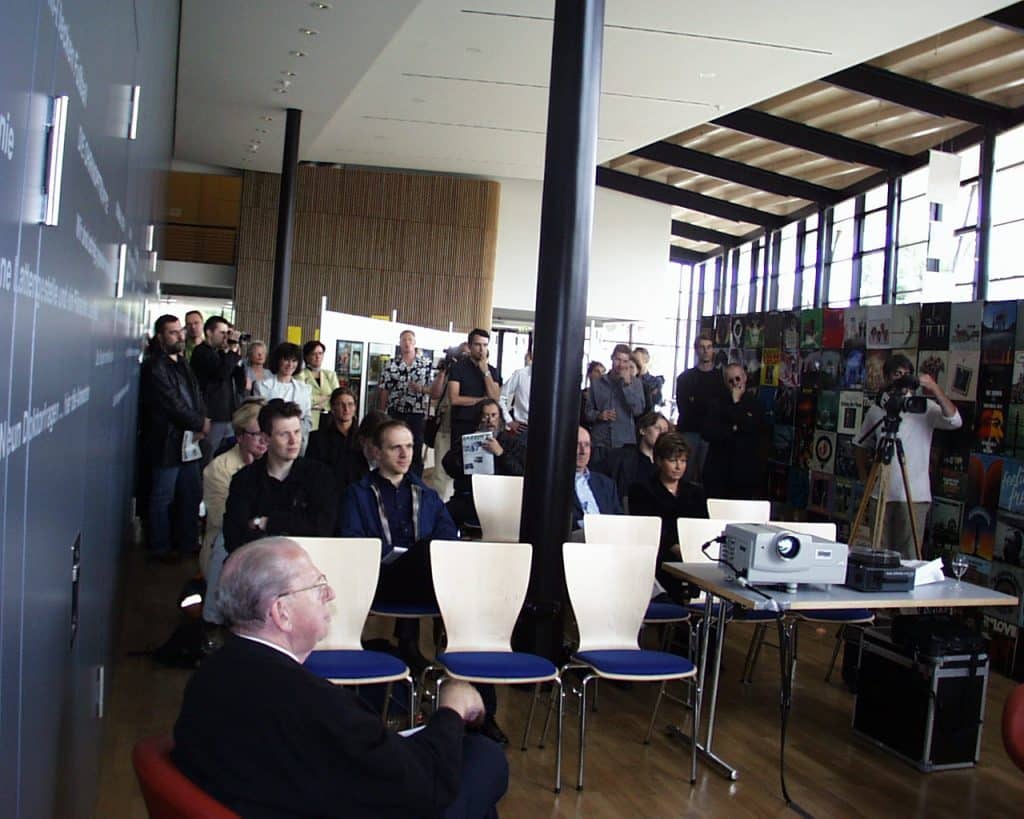
Front left HGBS, 1999 at the press conference for the book release “Jazzin The Black Forest” in the Neue Villinger Tonhalle (Photo: Andreas Rottmann/MPS-Studio e.V.)
JAZZIN’ THE BLACK FOREST 1999
In 1999, I had the opportunity to have various telephone conversations with Berendt in the course of the book production “Jazzin’ the Black Forest“, which I published. After the author – Klaus-Gotthard Fischer – had also only mentioned Berendt in a few sentences, I initiated an interview with JEB for the book. I sent him my list of questions by post. The answers were not long in coming. On the phone, he was then readjusted, it seemed as if he had never received enough recognition and affection for his work.
He almost came to Villingen for the presentation of the book in June 1999, after all we had engaged Lee Konitz, Wolfgang Dauner and the Gunter Hampel Quartet with Alexander von Schlippenbach, Manfred Schoof and Pierre Courbois, all old companions of Berendt! Mike Hennesey was the host of the evening in the new Tonhalle, and alongside the concert there was an exhibition of MPS record covers and objects such as. the Sabamobile, various DJs played MPS rare groove jazz. The entire feuilleton press had registered. HGBS was present and enjoyed this special evening to the full, after all, his life’s work was being celebrated here. He was moved when Wolfgang Dauner played one of the first works he had recorded at HGBS’s home in the late 1950s, when HGBS was still in the technical experimentation phase.
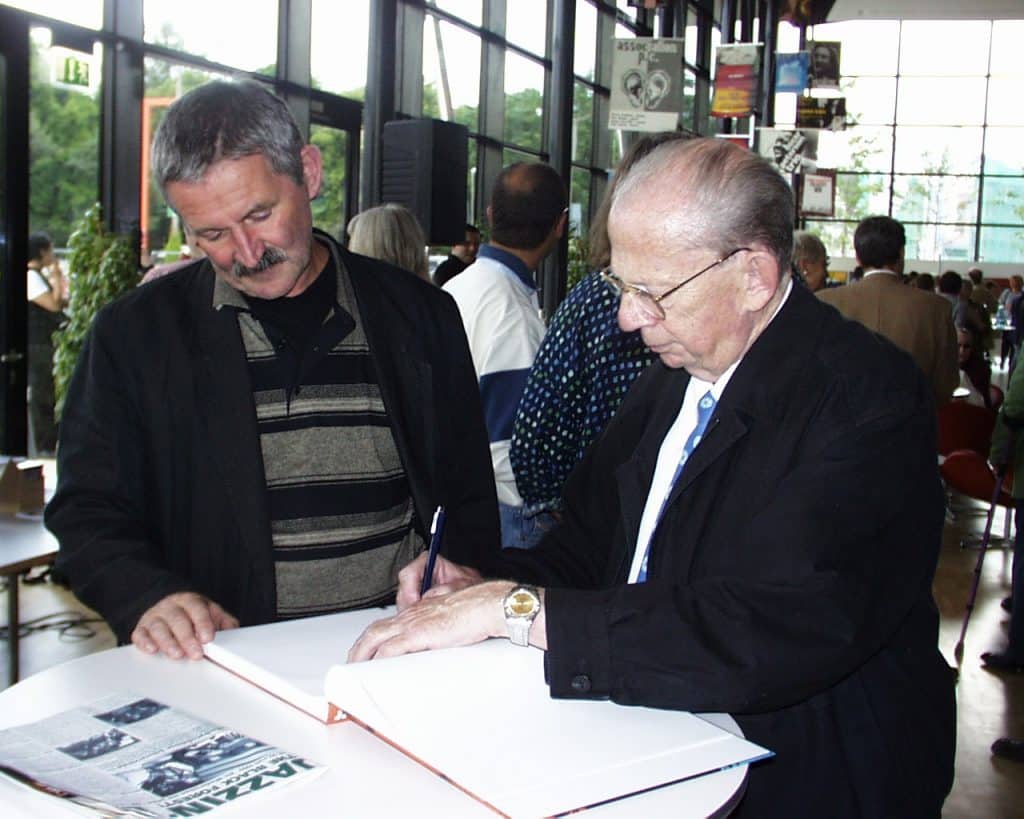
HGBS signs “Jazzin The Black Forest” for a former Saba employee in the Villingen Tonhalle (Photo: Andreas Rottmann/MPS-Studio e.V.)
At first, JEB categorically refused to come to the presentation in the Black Forest. He no longer wanted to deal with MPS, he had turned his attention to new fields of interest.
I explained my view that the collaboration between HGBS and JEB was important for the reputation of MPS, indeed a stroke of luck, and that after so many years we could reconcile over a glass of wine and good music. At first there was silence on the phone, then he leafed through his calendar and seemed to be getting on board with the idea. Too bad, he already had a lecture in Stuttgart that evening.
Then in February 2000, just six months after our last contact, Berendt was hit by a car on a road in Hamburg and succumbed to his serious injuries shortly afterwards. In 2004, he was followed by HGBS, who died while crossing a crosswalk near his studio. Another house concert was actually planned. It was not meant to be.
Farewell Hans-Georg Brunner-Schwer and Joachim-Ernst Berendt! And if there is a studio up there: for the “Most Perfect Sound” you have certainly already spoken to Rolf Donner.
Töni Schifer
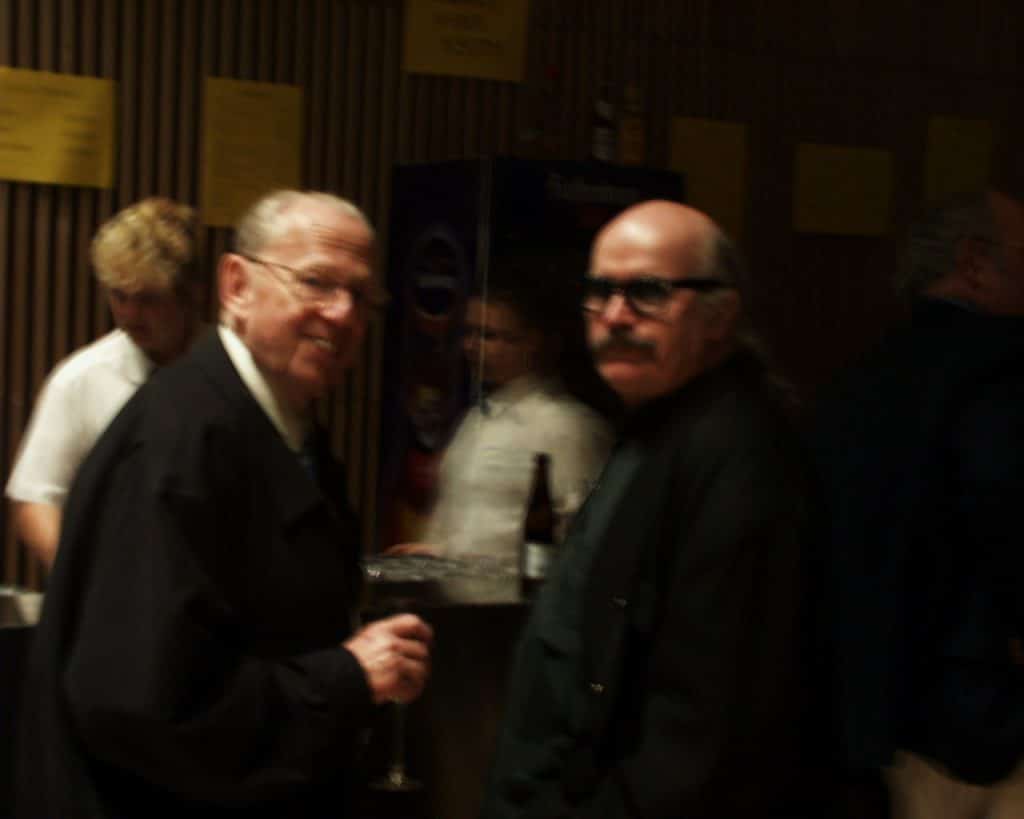
Goodbye – Blurred, like the memories: HGBS and Wolfgang Dauner, 1999, book presentation Villingen (Photo © Andreas Rottmann/MPS-Studio e.V.)
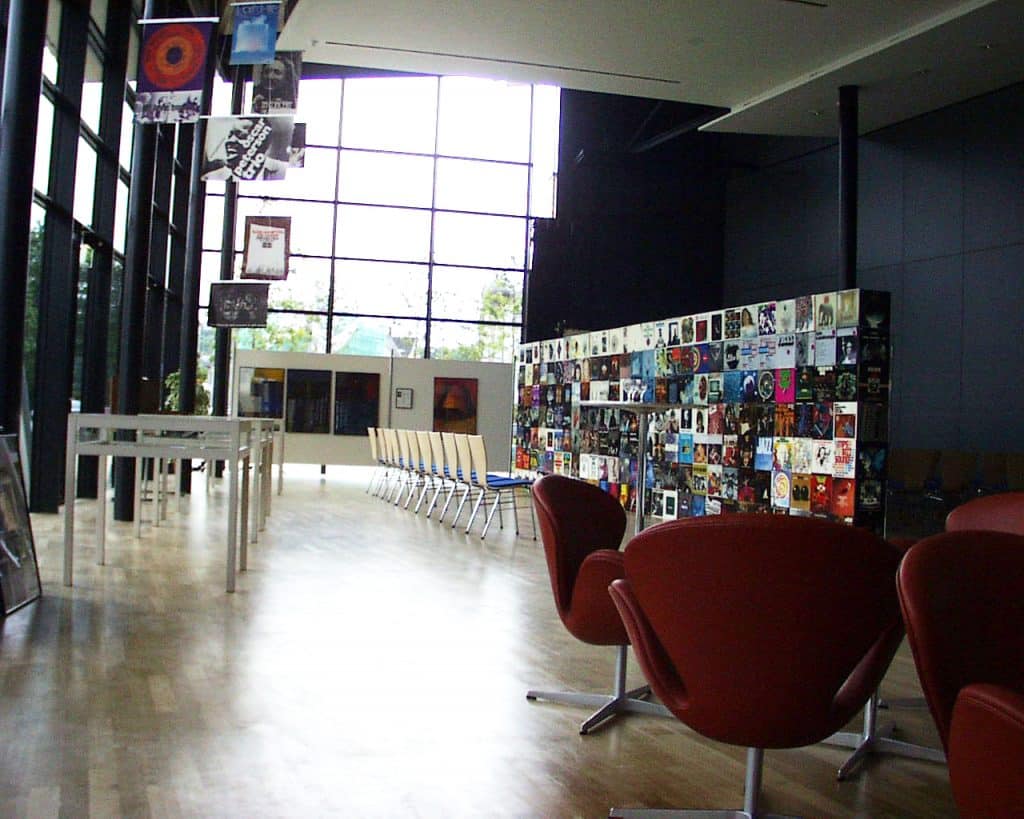
MPS exhibition June 1999 organized by Crippled Dick Hot Wax! in the Villingen Tonhalle, book presentation “Jazzin’ The Black Forest” (Photo ©Andreas Rottmann / MPS-Studio e.V.)
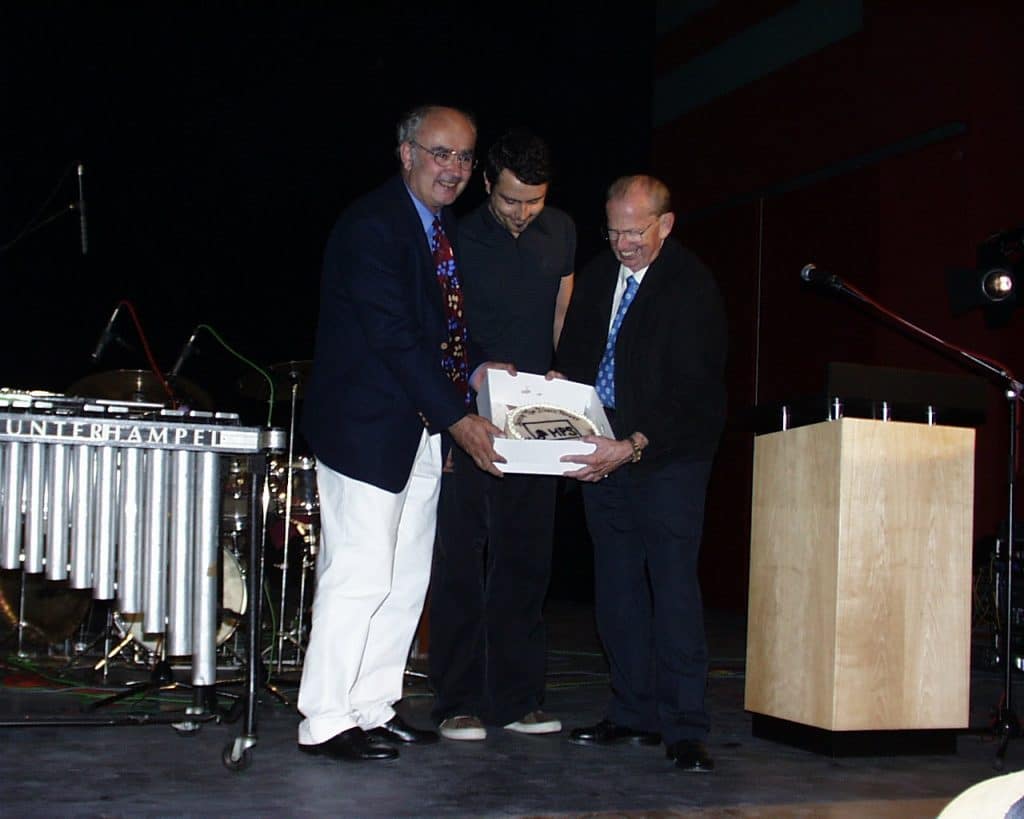
Group photo with MPS cake: from left to right: Klaus Gotthard Fischer, Töni Schifer and Hans-Georg Brunner-Schwer, 1999 Neue Tonhalle Villingen (Photo ©Andreas Rottmann / MPS-Studio e.V.)
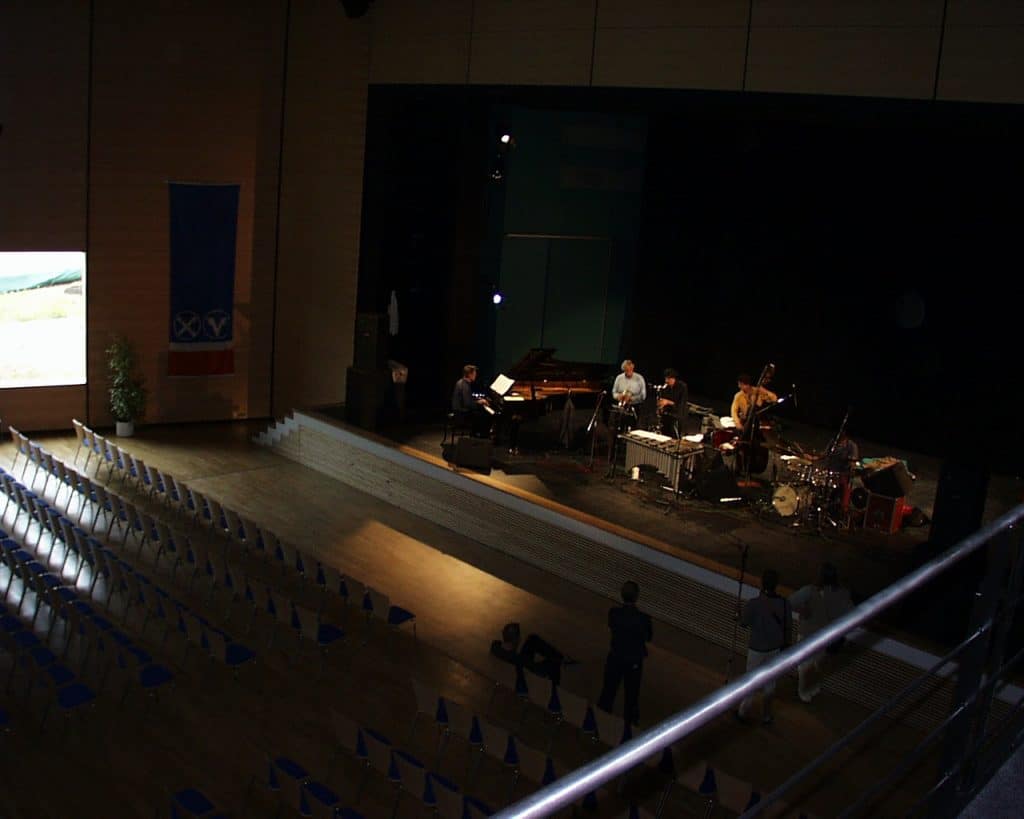
Soundcheck with the Gunter Hampel Quintett, Neue Tonhalle Villingen, book presentation “Jazzin’ The Black Forest” 1999. (Photo ©Andreas Rottmann / MPS-Studio e.V.)

